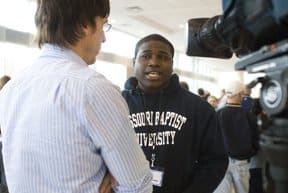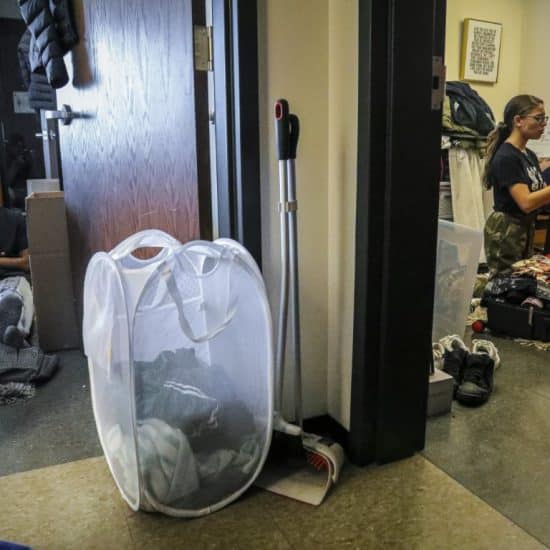ST. LOUIS — A five-sentence statement buried toward the bottom of a March 11 speech by Gov. Jay Nixon has kicked up a furor on private college campuses and left some students wondering if they will be able to finish their degrees.

Missouri Baptist University student Montez "Pilon" Brown is interviewed by KSDX-TV Channel 5 in St. Louis during a rally to protest Missouri Gov. Jay Nixon's proposal to cut state financial aid to students in private colleges and universities. (MBU photo)
|
Speaking at the Springfield Business Development Corp. annual meeting, the governor outlined some budget cuts the state must make to begin to plug an estimated $500 million hole in next year’s budget.
Gov. Nixon may partially plug that gap by diverting financial assistance to students at private institutions – a move students and administrators at the state’s independent colleges and universities — including four Baptist institutions — have decided to fight.
Missouri is reportedly the first state to consider cutting off aid to private school students.
A public letter-writing campaign and telephone bank drew almost 600 students, several faculty and staff, and a few parents at Missouri Baptist University’s St. Louis campus March 22. The turnout also caught the attention of most of the area’s media, including the Associated Press.
In his Springfield speech, the state’s top politician pointed to “vital” services that cannot be cut, such as the Highway Patrol and public school teachers.
Cuts, then, must come from nonessential services, including funding that gives students more college choices, he said.
“We also need to make changes in another well-intentioned area: financial aid for higher education,” Nixon told the Springfield business community. “Currently, many of our state college scholarship programs — both for merit and for need — provide financial support to students whether they choose to attend public or private colleges. In some cases, students at private schools actually get larger scholarships than students at public institutions.
“Missouri has wonderful colleges and universities, both public and private. But in times like these, we simply can’t continue to subsidize the choice to attend a private school.”
The governor contends the state will save at least $50 million by excluding private school students from all state financial aid programs — needs-based Access Missouri, merit-based Bright Flight (designed to keep Missouri young people in Missouri) and the Marguerite Ross Barnett program for part-time students.
But Baptist school administrators believe that a resulting economic impact in the long run will negate short-term gains.

Missouri Baptist University student Thomas Childress signs a letter of protest to Missouri Gov. Jay Nixon at a March 22 rally on campus. In a March 11 speech, the governor proposed cutting state financial aid to students at private colleges to help offset a large budget deficit. (MBU photo)
|
According to the Independent Colleges & Universities of Missouri organization, private institutions awarded 47 percent of all degrees in the state last year, including 67 percent of graduate degrees.
All four Baptist institutions in Missouri — MBU, William Jewell College, Southwest Baptist University and Hannibal-LaGrange College — belong to the coalition. ICUM has 21 members, including St. Louis University and Washington University. SBU president Pat Taylor currently serves as ICUM president.
The organization claims that private institutions’ direct economic impact on the state exceeds $3 billion each year.
“I do feel for the governor and the spot he’s in,” William Jewell president David Sallee said by phone on March 22. “We’ve got to be sensitive to the needs, but I don’t want to see his proposal adopted.
“Obviously he believes education is the building block for the state’s economy in the long run, but he may not be doing the right thing by limiting access to education.”
In a letter to faculty, MBU president R. Alton Lacey also recognized the state’s problem but emphasized the economic contributions private school students make.
“More than 80 percent [of MBU students] stay in Missouri where they become taxpayers and contributors to a highly skilled workforce,” he wrote.
The four Baptist institutions each indirectly receives from $1 million to $1.5 million through scholarships and grants the state’s programs provide their students.
MBU student Angela Dickson of St. Louis shared her story at the March 22 rally. “Education was never valued in my house…but then I had the opportunity to go to this school. Access Missouri made it possible,” she said. “And now the governor is pulling that out from under me.”
The sophomore psychology major added in a phone interview that she might not be able to realize her dream of helping abused children if she loses state funds. “And I won’t feel like I’m supported,” she said.
The transfer student from St. Louis Community College chose MBU because of its “smallness and how nice everybody is.”
“I didn’t find a state school that seemed to fit me,” she said. MBU “fits me educationally, socially.”
SBU’s Taylor called the governor’s proposal “unfair.” The university hosted a letter-writing campaign on March 16 that sent 84 appeals to the Capitol.
HLG president Woodrow Burt agrees that the possible cuts would significantly impact the Hannibal college but that the school is committed to helping students.
“We are going to do everything we can to make up any difference…to provide the aid to attract them to Hannibal-LaGrange. [Any cut] just simply makes it tougher for us to come up with enough aid,” he said in a phone interview.
Access Missouri is based on need rather than on the type of school, Ray Carty, HLG vice president for enrollment management explained. “We are disappointed that the governor would not consider students attending all campuses as the same with the same need,” he said.
“Our desire is that he not see it as students going to an independent institution but as students with need and that remain in the state of Missouri to be educated.”
Administrators expressed disappointment that the governor’s proposal came in the middle of Department of Higher Education task force discussions to equalize Access Missouri awards.
Currently, private school students can receive up to $4,600, while state university students can qualify for up to $2,150. A couple of pending bills are aimed at providing an equal sum for those who need it.
The Higher Education task force is also suggesting minimum grade point average standards students must meet and that the scholarship would only be awarded after all other aid is calculated.

